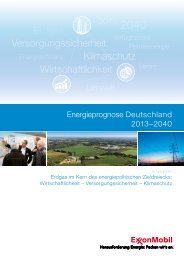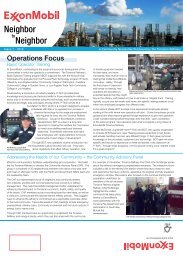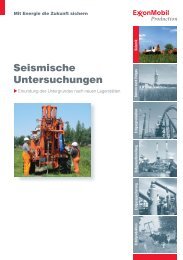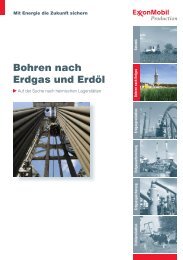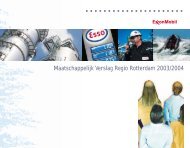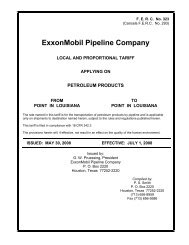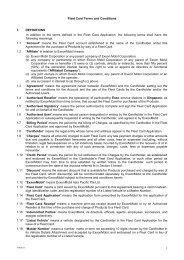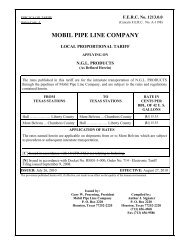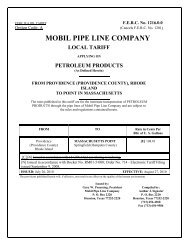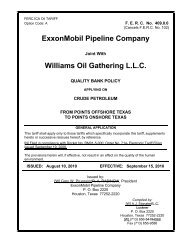profile: Chad/Cameroon -- Doba Basin - ExxonMobil
profile: Chad/Cameroon -- Doba Basin - ExxonMobil
profile: Chad/Cameroon -- Doba Basin - ExxonMobil
You also want an ePaper? Increase the reach of your titles
YUMPU automatically turns print PDFs into web optimized ePapers that Google loves.
<strong>profile</strong>:<br />
<strong>Chad</strong>/<strong>Cameroon</strong> – <strong>Doba</strong> <strong>Basin</strong>
2<br />
In 1993, after years of planning, negotiations and test drilling, the first project development<br />
teams mobilized to <strong>Chad</strong> and <strong>Cameroon</strong>. Their objective: to develop the estimated<br />
1 billion barrels of oil reserves in the <strong>Doba</strong> basin of southern <strong>Chad</strong>. Since <strong>Chad</strong> is a<br />
landlocked country, the plan also included a 665-mile (1,070 kilometers) pipeline to<br />
transport the crude oil across <strong>Chad</strong> and <strong>Cameroon</strong> to a tanker-mooring marine terminal<br />
off the <strong>Cameroon</strong>ian coast.<br />
The years of careful planning and construction effort paid off in October 2003, when<br />
the project exported its first barrel of <strong>Chad</strong>ian oil. This feat was accomplished by<br />
a consortium led by Esso Exploration and Production <strong>Chad</strong>, Inc (EEPCI). The<br />
<strong>ExxonMobil</strong> affiliate has a 40 percent interest in the project, which also includes<br />
the Malaysian national oil company PETRONAS (35 percent interest) and<br />
Chevron (25 percent interest). The project has exported more than 240 million<br />
barrels of crude oil to world markets.<br />
technical knowledge transfer<br />
Hundreds of <strong>Chad</strong>ians and <strong>Cameroon</strong>ians have received the technical training<br />
required to build and operate the production facilities, as well as trade skills<br />
training such as carpentry and electrical work. Since 2000, EEPCI has recruited<br />
more than 100 operations technicians for its production facilities in Kome, each<br />
of whom will complete a five-year training program in preparation for a future role<br />
in operations. More than $60 million has been spent on training since 2001.<br />
workforce training<br />
In early 2004, EEPCI opened a world-class technical training center at the Kome central<br />
oilfield facility to provide training for project employees from <strong>Chad</strong>. In addition to its<br />
international faculty, the center includes laboratories and simulators to teach students<br />
about hydraulics and electrical systems; computer classrooms; an extensive machine<br />
shop for teaching repairs and fabrication; and a technical reference library.<br />
national workforce development<br />
Due to our emphasis on hiring, training and promoting local<br />
workers, 88 percent of the 5,700 people employed by the<br />
project in <strong>Chad</strong> at year-end 2007 were nationals. Total<br />
direct employment in <strong>Cameroon</strong> is 1,200; 91 percent<br />
are <strong>Cameroon</strong>ian. Eighty percent of the <strong>Chad</strong>ians<br />
and <strong>Cameroon</strong>ians hold skilled, semi-skilled or<br />
supervisory positions.
major economic<br />
impact<br />
In addition to revenue generation, the most<br />
important economic effects of the project<br />
have been the transfer of technology and<br />
the creation of a new petroleum industry in<br />
<strong>Chad</strong>. The World Bank and Government<br />
of <strong>Chad</strong> developed a unique plan for the<br />
management of revenues from the oil de-<br />
velopment project that would benefit all<br />
citizens of the country. The multiplier effect<br />
of the project investment is helping to<br />
create economic development and jobs<br />
beyond the oil fields.<br />
national content<br />
Local companies benefit as this project<br />
relies on in-country vendors at every<br />
opportunity. Since construction began<br />
in October 2000, more than $1.5 billion<br />
in goods and services has been spent<br />
with approximately 2,000 <strong>Chad</strong>ian and<br />
<strong>Cameroon</strong>ian businesses.<br />
public consultation<br />
Since the 1993 start of the <strong>Chad</strong>/<strong>Cameroon</strong><br />
Development Project, more than 21,000<br />
consultation meetings involving 300,000<br />
people have been held. Based on input<br />
from this unprecedented number of public<br />
consultations, the project was able to<br />
redesign facilities to reduce impacts on<br />
people and habitat. For example, the pipe-<br />
line route was shifted more than 20 times<br />
to protect settlements and hunting grounds<br />
of the Bagyeli-Bakola people in <strong>Cameroon</strong>.<br />
Tens of millions of dollars were spent to<br />
move the pipeline route away from envi-<br />
ronmentally sensitive areas in the Mbéré<br />
Rift Valley and Deng Deng Forest areas.<br />
safety focus<br />
The pipeline traverses remote areas and<br />
required substantial infrastructure to come<br />
to fruition. Despite these challenges, we<br />
achieved an on-the-job safety record<br />
that is significantly better than the global<br />
average for the oil industry.<br />
building strong<br />
communities<br />
The project team has ensured transparency<br />
in compensation for the use of land that<br />
formerly comprised small farms. More than<br />
$18 million in cash and in-kind payments<br />
have been disbursed to villagers in <strong>Chad</strong><br />
and <strong>Cameroon</strong>. The project has contributed<br />
more than $9 million to an array of com-<br />
munity, health and environmental initiatives<br />
in <strong>Chad</strong> and <strong>Cameroon</strong>. The community<br />
compensation programs have funded new<br />
classrooms and school upgrades,<br />
community facilities such as<br />
marketplaces, water<br />
towers and wells,<br />
and farming<br />
equipment.<br />
The project partners also established ex-<br />
tensive public health programs focused<br />
on malaria and HIV-AIDS prevention.<br />
The <strong>ExxonMobil</strong> Foundation, through its<br />
Africa Health Initiative, has partnered with<br />
international NGOs to improve health and<br />
education in <strong>Chad</strong>. As a result, health clinics<br />
have been built or renovated and bed<br />
nets distributed to prevent the spread of<br />
malaria. Thirty-six primary schools have<br />
been renovated to include drinking water<br />
facilities, gender-specific toilet blocks and<br />
enhanced classroom infrastructure with<br />
funding from the <strong>ExxonMobil</strong> Foundation’s<br />
Educating Women & Girls Initiative. Teach-<br />
ing materials and improved teacher<br />
training on health, hygiene and safety are<br />
also being provided.<br />
3
5959 Las Colinas Boulevard<br />
Irving, Texas 75039-2298<br />
Printed entirely on recycled paper.<br />
exxonmobil.com<br />
05/2008




